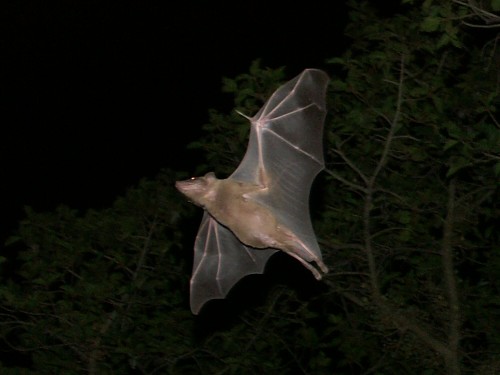 Bats can eat their weight in mosquitos. Some, 1,200 mosquitos every night, making them man’s best night flying friend.
Bats can eat their weight in mosquitos. Some, 1,200 mosquitos every night, making them man’s best night flying friend.
Have you ever noticed those night flying creatures that seem to flitter endlessly among date palm trees in the Middle East at night while making distinctive clicking sounds? If you have, chances are these creatures are not birds but Egyptian fruit bats which have been found to have an amazing ability to find their “target” by not aiming their vocal sonar beams directly but by pointing their “sound beams” to either side of the target.
A recent study was made by researchers at Israel’s Weizman Institute of Science, together with the University of Maryland in the USA, and found that their bats emit paired clicking sounds and that the sonar beam created by each click alternated to the left and right of a target. This alternating pattern effectively directed the inside edge, or maximum slope, of each sonar beam onto the target. As a result, any change in the relative position of the target to the bat reflected that large sonar edge back at the bat, delivering the largest possible change in echo intensity.
The researchers, which included Cynthia Moss of Maryland U’s Auditory Neuroethology Lab, more commonly known as “the bat Lab,” together withcolleagues Nachum Ulanovsky and Yossi Yovel of the Weizmann Institute, and Ben Falk, a graduate student in Maryland’s Neuroscience and Cognitive Science Program published their findings in a academic journal which also compared the bat’s amazing ability to “see” objects with that of other animals, including human beings with vision impairment.
As noted by Moss, the leader on this research program:
“We think that this tradeoff between detecting a object and determining its location is fundamental to any process that involves tracking an object whether done by a bat, a dog or a human, and whether accomplished through hearing, smell or sight”.
The researchers found that the sound mechanisms of the fruit bats are different from other bats which emit their sonar sounds directly at fast flying insects that are the bat’s food source.
Taking all of this into consideration, you might wonder what this has to do with the environmental attributes of bats themselves, which many people often associate with bad omens and folklore images of creatures such as vampires.
It turns out that bats have many positive environmental aspects, including eating as much as their own weight in flying insects per day (in the case of brown and other insect eating bats) and by pollinating fruit trees as well as spreading seeds. Most of them are vegetarian and act as “natural” predators against insects.
In fact, a small bat can eat a many as 1,200 mosquitoes in a single hour!
Organic bat dung a mine of minerals
Another attribute of bats is their very rich quano, or manure that contains high levels of phosphorous and nitrogen, and is often “mined” from bat caves and other places where large quantities of bats are known to congregate. Bat guano is often packaged and sold as organic fertilizer and many people mix it with compost in organic gardening.
Like many other animals in this region, the effects of crop spraying and environmental pollution have taken their toll on other animal populations, especially in Israel’s streams and rivers; and many farmers consider fruit bats to be nothing more than pests. Still, these very beneficial creatures have a definite place in nature’s ecological scheme of things, and more effort needs to be done to protect them.
A new study in Israel has found that bats are using abandoned army bunkers as hideouts and a donation from the Ford Foundation has helped create new “hanging’ space for some of the most endangered bat species in the Middle East living between the Palestinian Authority, Israel and Jordan. To read more on bats in bunkers, see the Haaretz story.
Articles on bats and Middle East wildlife:
Bats of Israel, Information (in Hebrew)
Bats are beneficial to Man
Pelicans Dine While Fish Pond Farmers Restock




cute bat…